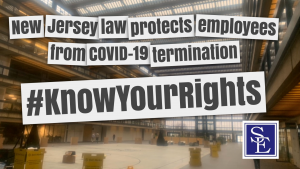For many working parents, school closures across the State of New Jersey since mid-March have posed insurmountable challenges as families attempt to manage work obligations with remote schooling and closed childcare centers. Now that the school year is over for most students and many summer camps are shuttered or running virtually, working parents are faced with a new set of childcare challenges that will impact their ability to fulfill work obligations. What options are available to working parents who are unable to balance the demands of work and childcare during Covid-19 closures this summer?
 The United States Department of Labor (DOL) said Friday in one of its guidance letters that working parents may be entitled to up to 10 weeks of partially paid leave over the summer to care for their children if they can show that the virus disrupted plans to send them to a summer camp. To be eligible for such leave under the Families First Coronavirus Response Act (FFCRA), covered workers include those employed by small and mid-size employers—those with more than 50 but fewer than 500 employees.
The United States Department of Labor (DOL) said Friday in one of its guidance letters that working parents may be entitled to up to 10 weeks of partially paid leave over the summer to care for their children if they can show that the virus disrupted plans to send them to a summer camp. To be eligible for such leave under the Families First Coronavirus Response Act (FFCRA), covered workers include those employed by small and mid-size employers—those with more than 50 but fewer than 500 employees.
How does an employee demonstrate the intended plans for his or her children to attend a summer program? Proof of summer camp plans were firm and then disrupted by the virus should be sufficient. The key inquiry is whether there is any “evidence of a plan” to rely on summer camp as a means of childcare, and to consider whether it is “more likely than not” that if the camp was running normally, the child would be attending. Examples of sufficient proof might be an application or deposit that was submitted to the camp, proof that a child was already enrolled in a camp that is now closed, showing the child attended summer camp in previous years, having the child’s name on a camp’s waitlist, or some other indication of the worker’s intent to enroll the child(ren). At a minimum, the employee’s affirmative steps to secure a spot in a summer camp evidences “plans” that should satisfy FFCRA’s requirement for coverage. An employee who merely expressed an interest in a summer program but took no concrete steps toward enrollment will likely not be covered.
 New Jersey Employment Lawyers Blog
New Jersey Employment Lawyers Blog

